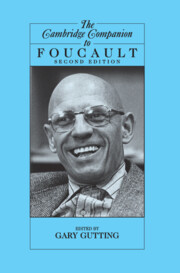Book contents
- Frontmatter
- Introduction Michel Foucault: A User’s Manual
- 1 Foucault’s Mapping of History
- 2 Foucault and the History of Madness
- 3 The Death of Man, or Exhaustion of the Cogito?
- 4 Power/Knowledge
- 5 Ethics as Ascetics: Foucault, the History of Ethics, and Ancient Thought
- 6 Michel Foucault’s Ethical Imagination
- 7 The Analytic of Finitude and the History of Subjectivity
- 8 Foucault’s Encounter with Heidegger and Nietzsche
- 9 Foucault and Habermas
- 10 Foucault’s Relation to Phenomenology
- 11 Against Interiority: Foucault’s Struggle with Psychoanalysis
- 12 Foucault’s Modernism
- 13 Queering Foucault and the Subject of Feminism
- Bibliography
- Addendum to Bibliography, 1993–2005
- Index
13 - Queering Foucault and the Subject of Feminism
Published online by Cambridge University Press: 28 August 2006
- Frontmatter
- Introduction Michel Foucault: A User’s Manual
- 1 Foucault’s Mapping of History
- 2 Foucault and the History of Madness
- 3 The Death of Man, or Exhaustion of the Cogito?
- 4 Power/Knowledge
- 5 Ethics as Ascetics: Foucault, the History of Ethics, and Ancient Thought
- 6 Michel Foucault’s Ethical Imagination
- 7 The Analytic of Finitude and the History of Subjectivity
- 8 Foucault’s Encounter with Heidegger and Nietzsche
- 9 Foucault and Habermas
- 10 Foucault’s Relation to Phenomenology
- 11 Against Interiority: Foucault’s Struggle with Psychoanalysis
- 12 Foucault’s Modernism
- 13 Queering Foucault and the Subject of Feminism
- Bibliography
- Addendum to Bibliography, 1993–2005
- Index
Summary
Each of my works is part of my own biography.
I’ve always conceived of [my books] as direct experiences aimed at pulling myself free of myself, at preventing me from being the same.
I don’t write for an audience. I write for users, not readers.
Critique doesn’t have to be the premise of a deduction which concludes: this then is what needs to be done. It should be an instrument for those who fight, those who resist and refuse what is . . . It is a challenge to what is.
Michel FoucaultNietzsche once said: “I am not a man; I am dynamite!” - an image that suggests that in overcoming ascetic ideals he was destroying himself as well. Despite the influence of Nietzsche and his own interests in self-overcoming, when referring to his own work Foucault preferred the less explosive metaphor of the toolkit. Foucault invited his readers - after all, in order to use him we must read him - to pick up what they found usable and ignore or discard the rest.
To be sure, self-overcoming was a central feature of Foucault’s project as he described it toward the end of his life. Moreover, in the Nietzschean vein, he privileged critique over efforts to establish procedures and norms necessary to legitimate social and political order – destabilizing rather than securing our identities as human beings. In referring to his works as part of his biography, he was suggesting not only that the problems he targeted were based on his own experiences, but also that the very practice of doing archival research and writing genealogies altered his self-understanding – his works literally “worked” to transform the self.
- Type
- Chapter
- Information
- The Cambridge Companion to Foucault , pp. 379 - 400Publisher: Cambridge University PressPrint publication year: 2005
- 7
- Cited by



